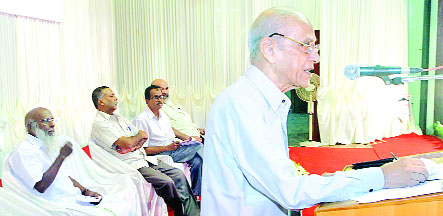Gandhi and Ecology
Posted on: 29 Jul 2010

Ramaswamy R Iyer
I am very grateful to the Mathrubhumi management for their kind invitation to the function. It is an honour and a privilege to be invited to inaugurate such a function. I am very doubtful of my credentials for that honour, but shall refrain from planting those doubts in the organisers' minds. I accept the honour with gratitude and humility.
With Mahatma Gandhi's visit to the Mathrubhumi office in 1934, that office became hallowed ground. Gandhiji was surely one of the greatest human beings not only of the millennium but of several millennia. As has been said by many, he belongs in the company of the Buddha and Jesus. In South Africa, Jan Christian Smuts, the man against whom Gandhi was fighting a battle, described him as 'a man of god'. It is interesting that as early as 1909 Gopal Krishna Gokhale recognized Gandhi's greatness with the remarkable words '...a purer, nobler, a braver and a more exalted spirit has never moved on this earth… in him Indian humanity at the present time has really reached its high watermark'.
Einstein's words at Gandhi's death, often quoted, 'Generations to come will scarce believe that such a one as this ever in flesh and blood walked upon this earth', were indeed very apt. Maharishis, known to this country in ancient times, continue to emerge in modern times, and Gandhi was one of the greatest.
However, Gandhi was not only a mahatma; he was also a political leader, a social mobiliser, an outstanding general, a good manager, an institution- builder, a great communicator and journalist, mentor to many, a member of every Indian family, and a revolutionary thinker. It is that last aspect that we are concerned with today. It is remarkable what a wide range of subjects and issues he dealt with and commented upon in the course of his busy life, and how in each case he went to the heart of the matter, giving us in the process so many memorable observations that we keep quoting all the time.
He was one of the earliest to see that the west had not merely colonised and enslaved the land and the people of India, but had colonised their minds as well; and he was one of the first to resist this. The Hind Swaraj, written as long ago as 1909, was a powerful declaration of independence: not just political independence, but independence of mind, spirit and civilization from the
thralldom of western culture and civilization. Criticisms of western civilization are commonplace today, but Gandhi was a critic long before others. That was what made him the forerunner of the environmentalist and ecological movements of modern times. Those concerns and the words themselves came into currency much later. In the late 19th century, and in the early years of the 20th century, the general climate of opinion in the world at large was that of a belief in 'progress' and the conquest of nature through Science and Technology.
Those ways of thinking had come into India through colonial rule, and there was a general belief
that the future of India lay in discarding tradition (regarded as obscurantism and superstition), marching towards modernity through western education, embracing science and technology, and emulating western progress. Most eminent Indians of the time took that proposition for granted as self-evident. In that ambience, it was an astonishing performance for anyone to reject that current wisdom, to question the colonial imposition of western civilization on India, to subject that 'civilization' itself to fundamental criticism, and to undertake a rediscovery of the lost Indian ways of thinking and living. Gandhi's contemporary Ananda
Coomaraswamy was also a critic of modernity and western civilization, but he was a scholar read mostly by other scholars, whereas Gandhi spoke to all both through his writings and speeches, and through his life.
On what we now call 'sustainablity', two statements by Gandhi are often quoted and have acquired the status of classics: (1) 'The world has enough for everyone's need but not enough for anyone's greed'; and (2) 'God forbid that India should ever take to industrialism after the manner of the west...…….. If [our nation] took to similar economic exploitation, it would strip the world bare
like locusts.' Those two sentences, widely quoted in slightly varying versions, anticipate and encapsulate the entire environmental movement of modern times.
Apart from those two statements, which are recognisably related to the current environmental thinking, there are two other well-known statements: (3) 'There are people in the world so hungry, that God cannot appear to them except in the form of bread'; and (4)'I will give you a talisman. Whenever you are in doubt, or when the self becomes too much with you, apply the following test. Recall the face of the poorest and the weakest man [woman] whom you may have seen, and ask yourself, if the step you contemplate is going to be of any use to him [her]. Will he [she] gain anything by it? Will it restore him [her] to a control over
his [her] own life and destiny? In other words, will it lead to swaraj [freedom] for the hungry and spiritually starving millions? Then you will find your doubts and your self melt away.' There were certain other wonderful observations and declarations (for instance, about wanting the winds of the world to blow through the house) which I refrain from quoting.
To my mind, those statements, quoted and unquoted, together constitute a unity: they bring together Gandhi's concerns for nature, Planet Earth, basic human needs, justice and human dignity. They form part of an overall wisdom or philosophy or world view, or whatever we wish to call it, which came from many influences and sources: the Bhagawad Gita, the Sermon on the Mount, the
Koran and other religious texts; elements derived from Hindu, Buddhist and Jain traditions; western writings such as those of Ruskin, Tolstoy and Thoreau; and so on. In that composite Gandhian whole many elements can be discerned:
•compassion for all suffering, or feeling the suffering of others as one's own;
•an all-embracing inclusiveness;
• a strong sense of equity and social justice;
•ahimsa or 'non-violence' (not a negative virtue, but synonymous with love);
•unity of all creation (humanity, other species, vegetation, nature in general, future generations);
•dharma in its multiple senses (overarching moral order; ethical principles; the defining function or duty of particular groups; responsibility as distinguished from 'rights');
•trusteeship as against ownership (not only in relation to property or wealth, but also in relation to nature and natural resources);
•abstention from 'greed' (restraint, self-denial, sacrifice, austerity, voluntary poverty); and so on.
It was an extraordinarily comprehensive, inclusive, holistic vision; in Mathew Arnold's words, Gandhi saw life steadily and saw it whole. That was why he influenced not only Martin Luther King and Nelson Mandela who were political leaders, but also Arne Naess, a deep ecologist, J. C. Kumarappa and E. F. Schumacher, economists, Laurie Baker, architect, and many others.
That perspective provides a useful framework for dealing with the situation that confronts us today. Speaking personally, if I may, I have tried to encapsulate the Gandhian perspective in the three words that form the sub-title of my book Towards Water Wisdom: Limits, Justice, Harmony. As I explained in the preface to that book, each of those three terms 'has multiple meanings and all three are inter-related. `Limits' on water-use are necessary for ensuring equitable sharing (`justice') and for avoiding conflicts with others and with nature (`harmony'); `justice' means justice to other users of the resource, to those whose lives and livelihoods are likely to be disrupted by our plans, to other forms of life, and to future generations (that harks back to `limits' and forward to `harmony'); and `harmony' means harmony with fellow human beings within and beyond political borders and with nature (that refers us back to `limits' and `justice'). Everything is connected with everything else'. I tried to show that the water crisis that everyone was projecting was part of a larger crisis of `development'. In what follows I shall draw to some extent upon the discussion in my book.
The crucial between 'development' and the environment, or are they reconcilable? The usual answer is that there is no necessary conflict between the two and that they can be harmonised. A related assertion is that technology holds the key; that it will
provide answers to all problems, including those created by technology itself. I have serious difficulties with both those statements. In my view, it would be right to say that there is no conflict between 'development' and the environment if and
only if our understanding of what constitutes `development' undergoes a radical change.
Consumption is at the heart of the prevailing notions of development. Consumption requires production; and so we genuflect before the twin gods of consumption and production. In this kind of developmental process, it is not possible to remain stationary at a certain level of production and consumption; each year's production and consumption must be higher than the previous
year's, or else stagnation and decline will set in. Thus those who wish to pursue ever?rising standards of living are firmly and inescapably mounted on the treadmill of `growth'. Inevitably, whether we aim at 10% or 8% or even 5% growth, the draft on natural resources and the pollution and contamination of soil, air and water can only increase. It is simply not true that `development' as now understood can be reconciled with `environment', using that as a shorthand term.
Our ecological footprint needs to shrink drastically, but it keeps growing larger. When Mahboob ul Haq first said that growth was not enough, it was a landmark statement indicative of a major shift in thinking. We now need another major shift and one more landmark statement, perhaps to the effect that growth is not only not enough but is even questionable; that it is a fatal delusion; that its pursuit is a spell from which we must free ourselves; and that our goal should be sanity, justice, stability, and harmony.
Let me turn now to the second point I referred to earlier, namely, that technology has all the answers. Technology is of course part of our lives, and not all of it is sophisticated or `high'. We use technology all the time. Nor is technology something new in human history. However, it is clear that after the Industrial Revolution there was a dramatic change in the magnitude, scale and
complexity of technology, and an even greater change when a Technological Revolution followed. Consider the following illustrative instances of modern technology: - deep power-driven borewells and tubewells sucking aquifers dry; - mammoth dams that kill rivers (that may not be true of all dams, but it is certainly true of some); - giant trawlers devastating marine life; - gigantic oil tankers transporting crude and petroleum products, with the inevitability of oil spills from time to time, with dire consequences for aquatic life and for coastal areas; - large modern metallurgical, chemical and petrochemical industries operating under horrendous temperatures and pressures, and handling highly toxic substances, with the related grave risks, and causing pollution and
contamination on a scale that is enormously difficult to remedy or control; and so on.
Destruction runs through that list. In my book I tried to indicate this by using the term 'development as destruction'. The process of paying for that Faustian pact began long ago: catastrophes such as Bhopal, Chernobyl, Exxon Valdez, and now the BP oil-spill of 2010, are not incidental occurrences but ineluctable concomitants to the process of technological advancement
that we have embraced ardently. Humanity is now under the tyranny of technological change. In any given instance, the change may be useful or trivial or unnecessary or dangerous, but the point is that we cannot opt out of change; we are riding a tiger and cannot dismount. I recognize, of course, that even if we feel that humanity is now on the wrong path, it is impossible to identify the particular stage at which we entered that wrong path, the particular moment when technological change acquired
a life of its own and began to grow like a cancer. At every stage, each new development seemed inevitable. We have come a long way from the hypothetical point where we could perhaps have stopped and said 'no further'. We cannot rewrite history; we have to live in the present. However, it is one thing to say that we cannot go back to the past and change it, and another to say that we must proceed further unthinkingly towards doom and destruction. Whether that march can be reversed or even slowed down, one does not know; but we must at least begin to think along those lines.
Apart from the destructive aspect of 'development', there is also a pathological aspect. Consider a few examples that cast a lurid light on what we call civilization, namely, the Mad Cow disease and the related slaughter of millions of animals; the unimaginable pain and cruelty that the growth of the pharmaceutical and cosmetics industries have meant for countless animals and
birds; the implicit assumption of the subservience of other species to human needs and the perceived dispensability of those species; the horrors of 'factory farming' of animals and birds; the immense distress that 'developmental' projects and programmes of various kinds have inflicted on large numbers of human beings, and in particular on the poor and the disadvantaged and on tribal
communities, by way of involuntary displacement, loss of livelihoods, and so on; and above all, consider the relentless depletion of natural resources and the infliction of grave damage on the air, soil, forests, mountains, oceans and water sources that we depend on for our survival. I do believe that `civilization' as it has emerged in the West and has been adopted by the rest of the world is not
a healthy condition but a sickness. To the phrase `development as destruction' used earlier we need to add another: `development as disease'. Consider life in a modern metropolis: unsafe streets, random violence, apartment blocks barricaded like fortresses, and so on. These are almost indices of development! This has nothing to do with the new preoccupation with security; it began much
earlier.
Over and above this, there is now another factor that we can no longer ignore, namely, climate change. There is hardly any doubt that human intervention for `development' has played a part in this, even if there is some difference of opinion as to the extent of that part. Large industry, mining, dams, diversions of rivers, canal irrigation, groundwater-drilling, urban conglomerations,
exploding automobile populations, highways (including expressways and flyovers), railway lines, long-distance power transmission lines, and so on: all this has undoubtedly produced a spectacular world, but it has also brought about or contributed to the irretrievable change that has now become manifest. Humankind appears to have already succeeded in partially damaging its habitat beyond repair.
At this stage, let me take note of some views or positions that are very different from and opposed to mine.
I start with the 'primacy of development' argument. The holders of this position would say 'yes, the protection of the environment is important, but not at the cost of development. Development comes first'. Leaving aside the basic question of what they mean by development, let us consider the matter in their own terms. They say: 'environment, but not at the cost of development', but can
we have development (in their own sense) at the cost of the environment? Is not a healthy natural environment and a good ecological system a precondition for what they call 'development'? When we have destroyed all aquifers, killed all
rivers by turning them into sewers or poison, denuded all forests, and made the water undrinkable and the air unbreatheable, what development can we have?
Faced with that question, they might say 'Yes, but let us be moderate; let us not go overboard and become eco-fundamentalists'. That is a dubious term, but accepting it, let us ask what can be more fundamental than our habitat, our water and the air. It seems to me that the more 'fundamentalist' we are about these things the better. What we have in fact had is developmental
fundamentalism. The pursuit of 'growth' and 'development' have brought us to the brink of disaster, and drastic changes are needed if we are to pull back from that brink.
That will fetch the response 'don't be alarmist; the earth is resilient and will recover from human abuse; if one resource is depleted, another can be found in its place; humanity will survive and so will Planet Earth'. That is a dangerously complacent view. Human abuse of nature has gone too far; and while there may be substitutes for, say, oil, there is no substitute for water which we are recklessly overusing and wasting.
A more extreme version of that anti-alarmist argument is what has been called Prometheanism or cornucopianism. Those who hold this view believe that the earth has limitless resources, that there is no danger of our exhausting them, and that any damage that we cause can be remedied. They tend to think that environmental concerns are bogus. (They may cite Bjorn Lomborg's book
The Sceptical Environmentalist. I do not have the time to discuss that book, but would request those who are interested to read Thomas Homer-Dixon's critique.)
Leaving that aside, the cornucopianist position I am referring to might have been plausible a few decades ago, but not any longer. It stands discredited by the vast body of knowledge and scientific opinion now available about the changes that
have taken place and are continuing to take place. There may be arguments about the pace of certain changes, and about the extent of human responsibility for them, but there is not much disagreement about the fact that changes with
serious implications are indeed taking place, and that human beings have contributed to them, if not caused them. It is also clear that there are indeed limits and that some of them have been crossed, or nearly so. Prometheanism
and cornucopianism have ceased to be credible positions.
I am aware that I am offering a series of cryptic pronouncements without elaboration. The time available does not allow me to substantiate my observations with facts and figures, but they are available in abundance in the IPCC Reports and in Al Gore's An Inconvenient Truth. (There have been attempts to discredit the IPCC, but we must not allow ourselves to be misled by that campaign.) I would also draw attention to the writings of the Canadian scholar Dr. Thomas Homer-Dixon, whom I have already mentioned.
Economists – not all of them but those of a certain persuasion – would suggest that market forces and proper pricing will ensure that scarce natural resources are prudently used and conserved. That is simply not true. There are some things that have an essential or existential value and not just an instrumental value and they cannot be priced; and while market forces might
induce a supply response to demand, it is difficult to see how they can ensure the conservation of nature. Market environmentalism seems to me an oxymoron.
Besides, 'profit' lies the heart of this philosophy, and how can that be reconciled with, say, water as life-support or as a fundamental right? One misleading and disingenuous economic argument must be taken note of, namely the Environmental Kuznets Curve thesis. This says that the process of development will indeed have an adverse impact on the environment but as
countries become prosperous and then wealthy this will change and the impact will become benign. This dubious thesis is illustrated by a graph which is wholly imaginary and is merely a restatement of the prose in diagrammatic form. As
countries become free of immediate scarcities and reach prosperity, they may indeed become more conscious of their surroundings and seek to improve them.
For instance, London and Washington have cleaned up the Thames and the Potomac. However, this applies only to the immediate neighbourhood. The draft that these and other metropolises make on the world's natural resources and their impact on the distant environment – in other words, their ecological footprint - will only increase and not diminish. That applies to the rich in our own country.
Contrary to the famous and misinterpreted Stockholm statement of Mrs. Indira Gandhi, it is the rich and not the poor that pollute and contaminate the earth.
Another curious proposition, asserted not very long ago, was that greed was necessary and important as it was greed that built the glittering world that we see around us today. Ayn Rand was a proponent of this view, and the once-famous Alan Greenspan, former Chief of the US Federal Reserve, was an admirer of that writer. Well, Alan Greenspan's reputation is now in tatters. One
might wonder whether the 'civilization' that greed built was indeed worthy of that name, and remember Gandhi's cryptic remark about western civilization.
Leaving that aside, and granting that greed built that civilization, the point is that greed is also destroying it. Greed lay at the heart of the financial crisis that shook the capitalist world to its foundations and has not been overcome as yet.
Finally, some may ask: 'But is not growth important and necessary?' I have already answered that question. What we need is a caring and humane society, a just society, a conflict-free, harmonious society, a stable, sustainable society. In his book The Idea of Justice Amartya Sen argues that instead of worrying about justice in the abstract, we should try and deal with the actual
injustices that we see around us. Similarly, instead of focusing on a certain rate of economic growth, let us deal with destitution, hunger, disease, illiteracy, loss of livelihoods, the despair that leads to farmers' suicides, the burdens cast on women, and so on. I was about to add 'then growth will look after itself', but as I have already pointed out, even a 6% rate of growth may cast a heavy burden on Planet Earth and may not be sustainable indefinitely.
My imaginary interlocutor may ask: 'But will not slowing down growth have painful consequences?' Of course it will. Radical change of any kind cannot be a painless process. Unfortunately, we (meaning the western world, and following it,
the rest of the world) have brought this predicament upon ourselves through our pursuit of a wrong idea of development. However, persistence in that course will also not be painless; in fact it will cause much greater pain in the long run.
Let me conclude by returning to Gandhi. Is it not time – more than time –that we remind ourselves of the wise and prescient sayings of Mahatma Gandhi quoted earlier, and undertake a radical overhaul of our thinking and of our lives?



















